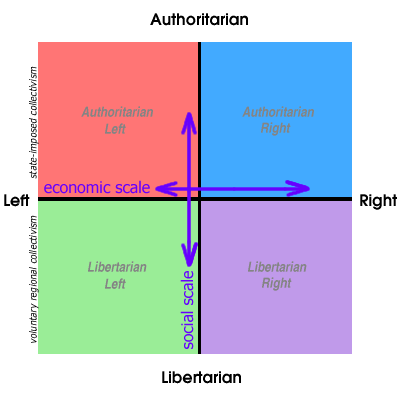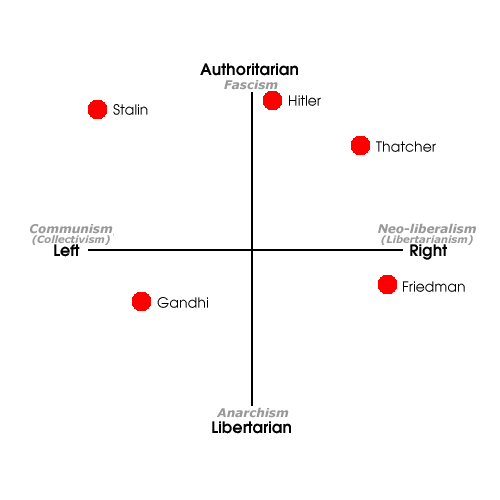This is a fascinating test...worth doing if you wish to find your political outlook in a complex way. It predates the Corbyn phenomena...but is still very valuable.. here is the test lets find out what you really believehttps://www.politicalcompass.org/test
if we recognise that this is essentially an economic line it's fine, as far as it goes. We can show, for example, Stalin, Mao Tse Tung and Pol Pot, with their commitment to a totally controlled economy, on the hard left. Socialists like Mahatma Gandhi and Robert Mugabe would occupy a less extreme leftist position. Margaret Thatcher would be well over to the right, but further right still would be someone like that ultimate free marketeer, General Pinochet.
That deals with economics, but the social dimension is also important in politics. That's the one that the mere left-right scale doesn't adequately address. So we've added one, ranging in positions from extreme authoritarian to extreme libertarian.

Both an economic dimension and a social dimension are important factors for a proper political analysis. By adding the social dimension you can show that Stalin was an authoritarian leftist (ie the state is more important than the individual) and that Gandhi, believing in the supreme value of each individual, is a liberal leftist. While the former involves state-imposed arbitrary collectivism in the extreme top left, on the extreme bottom left is voluntary collectivism at regional level, with no state involved. Hundreds of such anarchist communities existed in Spain during the civil war period
You can also put Pinochet, who was prepared to sanction mass killing for the sake of the free market, on the far right as well as in a hardcore authoritarian position. On the non-socialist side you can distinguish someone like Milton Friedman, who is anti-state for fiscal rather than social reasons, from Hitler, who wanted to make the state stronger, even if he wiped out half of humanity in the process.
The chart also makes clear that, despite popular perceptions, the opposite of fascism is not communism but anarchism (ie liberal socialism), and that the opposite of communism ( i.e. an entirely state-planned economy) is neo-liberalism (i.e. extreme deregulated economy)

The usual understanding of anarchism as a left wing ideology does not take into account the neo-liberal "anarchism" championed by the likes of Ayn Rand, Milton Friedman and America's Libertarian Party, which couples social Darwinian right-wing economics with liberal positions on most social issues. Often their libertarian impulses stop short of opposition to strong law and order positions, and are more economic in substance (ie no taxes) so they are not as extremely libertarian as they are extremely right wing. On the other hand, the classical libertarian collectivism of anarcho-syndicalism ( libertarian socialism) belongs in the bottom left hand corner.
In our home page we demolished the myth that authoritarianism is necessarily "right wing", with the examples of Robert Mugabe, Pol Pot and Stalin. Similarly Hitler, on an economic scale, was not an extreme right-winger. His economic policies were broadly Keynesian, and to the left of some of today's Labour parties. If you could get Hitler and Stalin to sit down together and avoid economics, the two diehard authoritarians would find plenty of common ground.
The EU Referendum
Remain voters were themselves divided between:
- Those enthusiastically embracing the EU's prevailing economics (neoliberal/free trade) but unhappy with the Social Charter and Chapter — especially on migration. This is a position held by many Conservatives.
- Those happy with both the economic and social provisions, which includes many people on the centre/right of the Labour Party, almost all Lib Dems and some wet Tories
- Those enthused by at least most of the EU's social provisions, but rejecting corporate values and neoliberal economics (left-of-centre social liberals eg Labour leader Jeremy Corbyn).
Brexit voters were similarly divided between:
- Those rejecting the EU's prevailing economics but accepting, at least to some extent, the social dimension (many Laboure supporters)
- Those rejecting both (quintessentially UKIP)
- Those comfortable with many of the EU's economic provisions, if only they could easily exit the Social Chapter (Conservative)
The attitudes of C and D, and also those of A and F, are similar; though because of contrasting degrees of feeling they resulted in a different vote.
Fundamentally, our social scale measures the extent to which diversity in social and cultural matters is a stimulus (libertarian) or a threat (authoritarian). These instincts inform our attitudes to all kinds of issue — from abstract art to sexual identity, foreign cultures, and crime and punishment. There is little doubt that the average Brexiter would show a less socially liberal score in our test. In the EU referendum, the social debate was largely about national identity, cultural diversity, sovereignty and, of course, migration.
The referendum also served as a vehicle for expressing discontent — or plain contempt — for the spiralling rich-poor gap, out-of-touch politicians and self-serving bureaucrats, and general anger among those alienated and left behind. Anti-Westminster sentiments were re-directed towards the EU which, after all, largely simply reflects the prevailing politics of its members. The referendum made more clear than ever the uneasy alliance of Labour voters — the marginalised and socially conservative in the northern regions, and the liberal centre-left élite in the metropolitan areas. While these two distinct categories might find little to disagree upon in economics, on the social scale the urban élite Labour voter is likely to have more in common with Lib Dems or the Tory "left".
Although it went almost unnoticed, UKIP leader Nigel Farage's extraordinary victory speech included reference to having 'fought against multinationals and big merchant banks'. That, from a figure generally seen to be to the right of the Tories! This is the populist formula common to all of Europe's other right wing 'anti-establishment parties' … picking up some of the discarded economic baggage of ideologically threadbare mainstream left parties, and wrapping them in the flag. It's an appeal to those who are afraid, angry and left behind. It's called national socialism. Without the constraints of Brussels, could the UK be moving towards its late Weimar phase? Certainly a classic prelude to authoritarian government is an enfeebled mainstream opposition.
Another thing to consider is that the demoralised Liberal Democrats might now have the perfect vehicle for a phoenix-like comeback. They're the only major party unshackled by complex divisions over Europe and leadership resentments. The Lib Dems have few fixed principles, but they have held an unswerving attachment to the EU. The party wasted no time in announcing that they'll campaign in the next election (perhaps sooner than expected) for EU re-entry. No need for another referendum. A vote for or against the Lib Dems would serve almost the same purpose.
As the Brexit process kicks in, the Lib Dems can be expected to pose an attractive option for some wet, socially liberal Conservative voters unhappy with Brexit, and maybe even an MP or two. Certainly the Blairite masses in the Parliamentary Labour party have more in common with the Lib Dems than with their own leadership — not to mention their own party members. If the Corbynites hold on, expect a haemorrhaging of MPs not to a new party but, more likely, to the Lib Dems. This in turn may lead to the Greens putting their lot in with an ideologically revitalised though representatively depleted Labour Party. But we're getting way ahead of ourselves.
A daunting cloud will hang over the devastated political landscape for who knows how long? The Lib Dems are meanwhile uniquely placed to make hay while there's no sunshine.
A Word about Neo-cons and Neo-libs
U.S. neo-conservatives, with their commitment to high military spending and the global assertion of national values, tend to be more authoritarian than hard right. By contrast, neo-liberals, opposed to such moral leadership and, more especially, the ensuing demands on the tax payer, belong to a further right but less authoritarian region. Paradoxically, the "free market", in neo-con parlance, also allows for the large-scale subsidy of the military-industrial complex, a considerable degree of corporate welfare, and protectionism when deemed in the national interest.
Uk Politics 2015



No comments:
Post a Comment